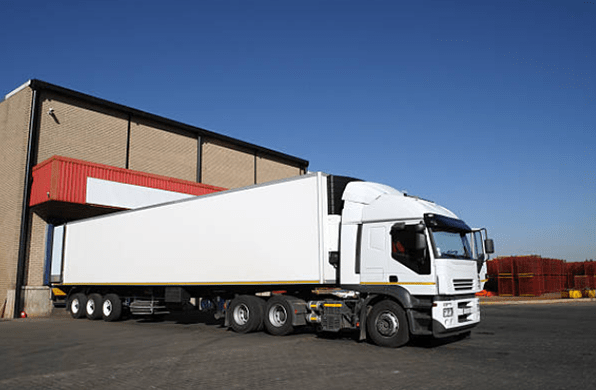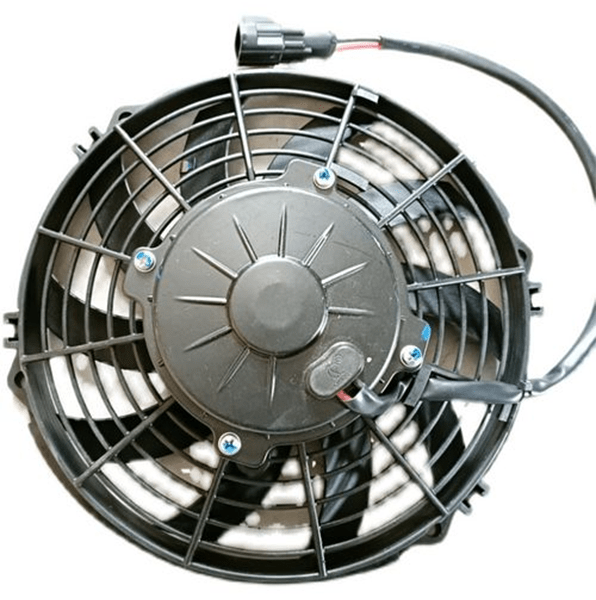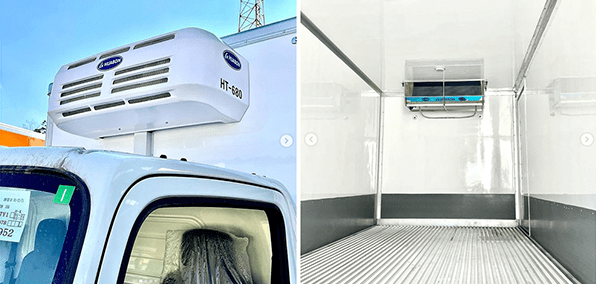
Figure 1: Refrigerated semi truck.
Refrigerated trucks, also known as reefer trucks, are a critical component of the transportation industry. They are specially designed vehicles equipped with temperature-controlled systems that enable the safe and efficient transport of perishable goods.
In this comprehensive guide, we will explore everything you need to know about refrigerated trucks, including their purpose, working mechanisms, benefits, considerations, future trends, considerations when renting or buying one.
1. What is a Refrigerated Truck?
A refrigerated truck is a vehicle specifically designed to transport goods that require temperature control to maintain their quality and freshness. It typically consists of specialized components, including insulation, a refrigeration unit, and temperature control systems. These components work together to create a controlled environment suitable for perishable products.
2. How Do Refrigerated Trucks Work
2.1 Insulation
The key to maintaining temperature stability within a refrigerated truck is the insulation. High-quality insulation materials are used to minimize heat transfer and maintain a consistent internal temperature.
2.2 Cooling System
The cooling system serves the purpose of removing heat from the products area. The system typically consists of a compressor, condenser, evaporator, and expansion valve.

Figure 2: Structural diagram of a refrigerated truck.
Compressor: The compressor is the heart of the refrigeration system. It compresses a refrigerant, usually a gas, to increase its temperature and pressure.
Condenser: The high-pressure and high-temperature refrigerant gas flows into the condenser, where it releases heat to the surrounding environment. As a result, the refrigerant turns into a high-pressure liquid.
Expansion Valve: The high-pressure liquid refrigerant passes through the expansion valve, which restricts its flow and reduces both its pressure and temperature. This process prepares the refrigerant for the evaporator.
Evaporator: The low-pressure and low-temperature liquid refrigerant enters the evaporator, located within the goods area of the truck. As the refrigerant evaporates, it absorbs heat from the goods, thereby cooling the air inside the truck. The air is circulated by fans to ensure even distribution of the cool air and maintain a consistent temperature throughout the goods area.

Figure 3: Condenser fan.
2.3 Temperature Control Systems
Refrigerated trucks are equipped with temperature control systems that include thermostats, sensors, and data logging capabilities. These systems help monitor and regulate the temperature within the truck to ensure the products remain in optimal condition.
3. Applications of Refrigerated Trucks
Refrigerated trucks are utilized across various industries due to their ability to transport perishable goods in a controlled environment. Some key applications include:
a. Food Industry: Refrigerated trucks play a vital role in transporting fresh produce, dairy products, meat, and seafood across long distances while maintaining quality and preventing spoilage.
b. Pharmaceutical Industry: Temperature-sensitive medications and vaccines require strict temperature control during transportation. Refrigerated trucks ensure the safe delivery of these vital pharmaceutical products.
c. Floral Industry: Flowers and plants are highly perishable and require specific environmental conditions to preserve their freshness. Refrigerated trucks provide the necessary cooling and humidity control to ensure their quality remains intact.

Figure 4: Refrigerated truck for meat transport.
4. Benefits of Using Refrigerated Trucks
a. Quality Preservation: The primary benefit of using refrigerated trucks is the ability to maintain optimal temperature and humidity levels, thus preserving the quality and freshness of the products.
b. Extended Shelf Life: By controlling the temperature and minimizing temperature fluctuations, refrigerated trucks help extend the shelf life of perishable goods, reducing product spoilage and waste.
c. Increased Flexibility: Refrigerated trucks provide businesses with the flexibility to deliver their goods anytime and anywhere, even to remote locations, expanding their market reach.
d. Expanded Market Reach: With refrigerated trucks, businesses can tap into distant markets, allowing them to cater to customers beyond their immediate geographical area.

Figure 5: Refrigerated truck and the inner view.
5. Considerations for Renting a Refrigerated Truck
When renting a refrigerated truck, several factors should be taken into account:
a. Rental Companies: Choose reputable and reliable rental companies with a fleet of well-maintained refrigerated trucks.
b. Size and Capacity: Select a truck that matches your products’ volume requirements to ensure efficient transportation.
c. Temperature Range: Ensure that the refrigerated truck offers the required temperature range for your specific products.
d. Additional Features: Consider features such as liftgates, GPS tracking, and security systems to enhance the safety of your goods and streamline logistics.
e. Rental Rates and Contracts: Understand the rental cost structure, including daily rates, mileage fees, and contract terms, to make an informed decision.
6. Key Factors to Consider When Buying a Refrigerated Truck
For businesses that require consistent use of refrigerated trucks, purchasing can be a more viable option. Consider the following factors when buying a refrigerated truck:
a. Budget and Financing Options: Determine your budget and explore financing options to select a truck that fits your financial capabilities.
b. Truck Size and Configuration: Assess your specific needs and choose between a box truck, straight truck, or a trailer based on freight volume and transportation requirements.
c. Maintenance and Service: Ensure proper upkeep of the refrigerated truck by establishing maintenance schedules and considering service contracts.
d. Regulatory Compliance: Understand and adhere to the Department of Transportation (DOT) guidelines and local regulations concerning the transportation of perishable goods.
e. Resale Value: Consider the potential resale value of the refrigerated truck to make a wise investment decision.

Figure 6: A refrigerated truck runs on the road.
7. Maintenance and Care for Refrigerated Trucks
Proper maintenance and care of refrigerated trucks are essential to ensure efficient operation and extend their service life. Consider the following maintenance practices:
a. Regular Inspections: Conduct routine inspections of door seals, ventilation, refrigeration units, and insulation to identify any potential issues.
b. Cleaning and Sanitization: Clean and sanitize the goods area regularly to eliminate any contaminants or odors that may affect the quality of the goods.
c. Battery and Fuel Maintenance: Ensure the truck's battery and fuel systems are properly maintained to support uninterrupted operation of the refrigeration unit.
d. Emergency Preparedness: Develop contingency plans to deal with power outages or mechanical breakdowns, ensuring minimal disruption to goods safety and quality.
8. Technologies and Innovations in Refrigerated Trucks
Refrigerated trucks have witnessed advancements in technology to improve efficiency and sustainability. Some notable innovations include:
a. Telematics and Remote Monitoring: Real-time data tracking and remote monitoring systems enable proactive management, temperature control, and troubleshooting.
b. Energy Efficiency: Development of eco-friendly refrigerants and improved refrigeration systems contribute to reducing carbon emissions and overall energy consumption.
c. Cold Chain Management: Integration of the Internet of Things (IoT) technology for improved supply chain visibility, ensuring temperature and quality control throughout the transportation process.
d. Hybrid and Electric Refrigerated Trucks: The adoption of hybrid and electric vehicles offers a more sustainable and environmentally friendly solution for temperature-controlled transport.
9. Future Trends in Refrigerated Trucks
With rapid technological advancements, several future trends are expected to impact the refrigerated truck industry, including:
a. Autonomous and Self-driving Vehicles: Introduction of autonomous and self-driving refrigerated trucks will enhance safety and efficiency in transportation.
b. Advanced Data Analytics: Implementation of data analytics and predictive maintenance systems will optimize truck operation, route planning, and maintenance schedules.
c. Blockchain Technology: The integration of blockchain technology will provide enhanced transparency and traceability within the cold chain process, ensuring higher product integrity.
d. Climate-Controlled Packaging: Integration of climate-controlled packaging with last-mile delivery solutions will maintain optimal temperature conditions for the final leg of the journey.

Figure 7: Food distribution refrigerated truck.
10. FAQs
10.1 How Much Does It Cost to Rent a Refrigerated Truck?
The cost of renting a refrigerated truck can vary depending on several factors, including the location, duration of the rental, size of the truck, and additional features or services included. On average, the cost of renting a refrigerated truck can range from $200 to $800 per day, with longer-term rentals usually offering discounted rates.
Keep in mind that these figures are estimates, and actual prices may vary. It's recommended to contact local rental companies or use online platforms that specialize in commercial vehicle rentals to get accurate and up-to-date pricing information for your specific requirements.
10.2 Who Invented the Refrigerated Truck?
The refrigerated truck was invented by Frederick McKinley Jones, an African American inventor and entrepreneur. He developed the concept of a refrigeration system for trucks in the 1930s. Jones was granted a patent for his invention in 1940.
His refrigeration system revolutionized the transportation of perishable goods, allowing them to be safely transported over long distances without spoiling. Jones' invention played a vital role in the development of the modern cold chain logistics industry, and he is recognized as one of the pioneering figures in refrigeration technology.
11. Conclusion
Refrigerated trucks are indispensable for businesses involved in the transportation of perishable goods. By understanding their purpose, working mechanisms, benefits, considerations, and future trends, businesses can make informed decisions on renting or purchasing refrigerated trucks. As technology continues to evolve, we can look forward to more efficient, sustainable, and secure cold chain solutions in the future
Related Info
Why Is My Portable Ice Maker Not Making Ice? Troubleshooting TipsHow Long Does It Take to Make Ice Cubes? Answers to All Your Ice-Making Questions
Samsung Refrigerator Ice Maker Not Working: Common Causes and Solutions
Cold Storage Warehouse: Everything You Need to Know
How to Clean a Portable Ice Maker: Tips and Tricks


